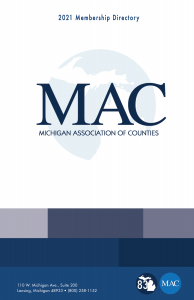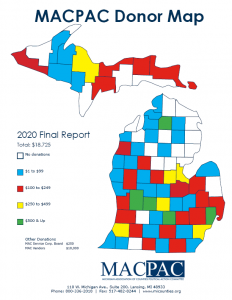Senate approves GOP plan on COVID spending
 In another move over the dispute on how to spend billions in federal COVID aid for Michigan, the Senate approved a $2 billion supplemental spending plan advanced by the Republican majority this week, but not without heated debate.
In another move over the dispute on how to spend billions in federal COVID aid for Michigan, the Senate approved a $2 billion supplemental spending plan advanced by the Republican majority this week, but not without heated debate.
Senate Bill 114, by Appropriations Chair Jim Stamas (R-Midland), was approved on a party-line vote and includes:
- $110.2 million for vaccine distribution
- $184.9 million for COVID testing
- $150 million for a $2.25 per hour direct care worker wage increase through Sept. 30
- $220.3 million for emergency rental assistance
Much floor debate centered on vaccine distribution requirements tied to the spending. The Michigan Department of Health and Human Services (DHHS) has adopted the Centers for Disease Control and Prevention’s (CDC) Social Vulnerability Index (SVI) when determining the county allocation of vaccine. Per DHHS vaccination guidance: “(T)he CDC Social Vulnerability Index (CDC SVI) for targeting distribution of supplies by geography within a phase of vaccination. The CDC SVI was used in establishing testing sites for COVID-19. The CDC SVI combines 15 U.S. census variables into a tool that helps local officials identify communities that may need support before, during, or after disasters. The CDC SVI is made up of indicators of socioeconomic status; household composition and disability; minority status and language spoken; and housing type and transportation. The CDC SVI status in Michigan communities correlates with the communities hardest hit by COVID-19 this spring, as well as areas of that state with high rates of risk factors for severe COVID-19 outcomes.”
The spending bill, however, would not allow “the use of race, gender, color, national origin, religion, sex or socioeconomic status as factors in determinizing the distribution of COVID-19 vaccines.” Proponents contended removing the index would get more vaccine more quickly to older Michiganians.
A second bill, SB 29, would spend more than $1.2 billion for education-related efforts.
Both bills await further House action when the House returns next Tuesday.
Also this week, the Senate Appropriations Committee moved House Bill 4047, by Rep. Tim Beson (R-Bay), that allocates $593 million. Of this, $150 million from the state General Fund would be dedicated for the unemployment trust fund. Additional federal funds would be dedicated to small business relief programs. The bill was not taken up for a Senate floor vote this week but is expected to be part of the final spending package presented to the governor.
State commission rejects MAC concerns, alters grant guidance manual
 MAC voiced concerns with sections of the manual used to guide indigent defense policies during a meeting this week of the Michigan Indigent Defense Commission (MIDC).
MAC voiced concerns with sections of the manual used to guide indigent defense policies during a meeting this week of the Michigan Indigent Defense Commission (MIDC).
MAC provided input and suggestions during the creation of the original grant manual in early 2020 to ensure it maintained a balance of supporting local control and administrative processes at the county level, while advancing the commission’s goal to streamline and rationalize the grant processes.
With just a few days’ notice of proposed changes, MAC quickly gathered input from county administrators and identified concerns on prohibiting grant funds for use as compensation for standby attorneys; costs incurred for feasibility studies; cumbersome time reports/studies for personnel, which could include salaried and union employees; and costs associated with local bar dues.
The commission went through each proposed change, with Isabella County Administrator Margaret McAvoy explaining the county point of view, and then rejected all but one concern raised by MAC. A footnote was included to allow costs of a feasibility study to be reimbursed by MIDC grant funds.
The final version with the changes can be found here.
For more information on this issue, contact Meghann Keit-Corrion at keit@micounties.org.
 Podcast 83 to discuss Capitol activity over previous week
Podcast 83 to discuss Capitol activity over previous week
The Podcast 83 team will resume its weekly reviews of legislative activity in Lansing and Washington, D.C., on Monday, March 1 at 3 p.m.
Click here to register for the live event, which will include a Q&A session on all of the hot legislative topics.
Members can view any previous episode of the Podcast, sponsored by DTE Energy, on the podcast webpage.
MAC directories entering the mail next week
 MAC’s 2021 Membership Directory will be mailed next week to all commissioners, administrators and county board offices across Michigan. The 2021 edition carries full listings of elected officials for all 83 counties and detailed information about MAC services and the Michigan Legislature in its 150 pages. MAC also will deliver copies to each legislative office, so lawmakers are reminded of the central role counties play in the delivery of local public services.
MAC’s 2021 Membership Directory will be mailed next week to all commissioners, administrators and county board offices across Michigan. The 2021 edition carries full listings of elected officials for all 83 counties and detailed information about MAC services and the Michigan Legislature in its 150 pages. MAC also will deliver copies to each legislative office, so lawmakers are reminded of the central role counties play in the delivery of local public services.
Each directory, on its Table of Contents page, also has the URL and password to access the digital, searchable flipbook of the directory, which MAC will update on a quarterly basis.
Once initial distributions are complete, MAC will have a small quantity of directories for sale at a price of $40. For more information on extra copies, contact MAC’s Derek Melot at melot@micounties.org.
MCMCFC leader pushes for visitation changes
 Renee Beniak, executive director of the Michigan County Medical Care Facilities Council (MCMCFC), joined other health leaders on Wednesday to testify on nursing home visitation policies before the House Health Policy Committee at the invitation of Rep. Bronna Kahle (R-Lenawee), chair of the committee.
Renee Beniak, executive director of the Michigan County Medical Care Facilities Council (MCMCFC), joined other health leaders on Wednesday to testify on nursing home visitation policies before the House Health Policy Committee at the invitation of Rep. Bronna Kahle (R-Lenawee), chair of the committee.
Beniak explained the frustrations facilities face, and manage, each day as state-set daily risk levels determine facility visitation practices. When risk levels drop and facilities begin a process to open for safe visitation, families are notified, but within a day, a single positive case can bring everything to a halt. Facilities then must turn away families and disappoint residents, leaving them frustrated and upset. The residents’ frustrations are often passed on to the nursing staff, making it even more difficult to provide care in facilities that were short-staffed even before COVID.
“It is time to rethink visitation policies and safely reconnect residents with family members,” Beniak said. “With the overwhelming majority of residents having received both vaccines, now is the time to relieve the tremendous burden that severely restricted visitation requirements have placed on our residents, families and staff. Our nurses and CNA staff have witnessed firsthand the physical and mental toll the extended isolation has taken on their residents, despite their best efforts to support alternate ways to connection them with family and friends over many months.”
Witnesses urged state leaders to begin considering a risk-benefit analysis to contracting COVID versus the psychological and physical consequences endured by residents with no or limited visitations. With all medical care facilities (MCFs) with a 90 percent vaccination rate, and routine precautionary measures in place, visitation restrictions should be lifted.
Beniak added there is a cost to this as well. Recently, one patient and their family specifically chose to stay longer in a hospital, rather than moving to a nursing facility for rehabilitation, because they will be allowed to visit their loved one in the hospital. Some hospitals offer this option because they have what is referred to as a “swing bed,” which changes a hospital bed into a nursing home bed. The swing bed, however, can cost 300 percent or 400 percent of the cost of a day of care in an MCF.
David Gehm, president of Wellspring Lutheran Services, told the committee that states like Indiana and Minnesota have visitation models that follow CDC guidance with some local adaptations.
Full video of the committee testimony can be found here.
Commission offers redistricting briefings for counties
 Members of Michigan’s new Redistricting Commission (MICRC) will be available in March to present information and answer questions about their work authorized by the voters at the ballot box in 2018.
Members of Michigan’s new Redistricting Commission (MICRC) will be available in March to present information and answer questions about their work authorized by the voters at the ballot box in 2018.
“For the first time in Michigan’s history, citizens are now in charge of redistricting to ensure fair congressional districts, Michigan State Senate districts, and Michigan House districts,” the commission stated in announcing the public outreach campaign. “The MICRC would like to send one of its commissioners or staff to present at the beginning of county board meetings for two to three minutes.”
Counties interested in such presentations should send an email to Redistricting@Michigan.gov and type “Redistricting Michigan” in the subject line. In the email, include the date or dates you have available and the time for the presentation.
MSU Extension also is offering a March 24 webinar on “Redistricting and Communities of Interest” as part of its “Current Issues” series.
“This webinar will provide participants with an overview of the redistricting process including work done by the University of Michigan Center for Local, State and Urban Policy on defining communities of interest. Participants will also have a chance to hear from three organizations that are deeply involved in this process about the work they are doing throughout the state to identify communities of interest that exist.”
The session will run from 10 a.m. to 11 a.m. EST on March 24. Click here to register for this event.
Deadline approaches to register for mental health courses
 The deadline is March 5 to register for a series of live webinars on managing mental health crises during March.
The deadline is March 5 to register for a series of live webinars on managing mental health crises during March.
The sessions will occur on March 10, 11, 17 and 18 from 2 p.m. to 5 p.m. This course is the equivalent of the 2-day classroom training and participants must attend all four sessions to receive a certificate.
“Managing Mental Health Crisis” is designed specifically for Michigan law enforcement, public safety and community mental health responders. It is funded by the Michigan Department of Health and Human Services, endorsed by the state’s Diversion Council and is MCOLES-approved and meets with MCOLES recommended annual officer trainings.
The cost is free, but seating is limited. Click here to register.
For additional information, contact J. Eric Waddell at jericwaddell@thecardinalgroup2.com.
 Staff picks
Staff picks
- Stuck at home, Michigan turns to alcohol amid COVID: Sales jump 20 percent (Bridge Magazine)
- Annual spring weight restrictions start Monday to protect Michigan’s roads (MDOT)
- Production of 2 COVID-19 vaccines creates hundreds of jobs in West Michigan (WWMT)
- Tulsa program gives remote workers $10,000 for buying a home (Governing)

 Gov. Gretchen Whitmer’s fiscal 2022 budget proposal makes important and much needed boosts to local governments dealing with the COVID-19 crisis and to public infrastructure, said MAC’s executive director on Thursday.
Gov. Gretchen Whitmer’s fiscal 2022 budget proposal makes important and much needed boosts to local governments dealing with the COVID-19 crisis and to public infrastructure, said MAC’s executive director on Thursday.
 The Michigan Association of Counties and Michigan Association of County Clerks
The Michigan Association of Counties and Michigan Association of County Clerks  Elizabeth Hertel, recently named by Gov. Gretchen Whitmer to lead the state’s mammoth Department of Health and Human Services, will be the guest on a special live episode of Podcast 83 on Tuesday, Feb. 16 at 4:30 p.m.
Elizabeth Hertel, recently named by Gov. Gretchen Whitmer to lead the state’s mammoth Department of Health and Human Services, will be the guest on a special live episode of Podcast 83 on Tuesday, Feb. 16 at 4:30 p.m. While
While  A bill to give tax breaks to firms installing new broadband equipment in Michigan cleared the Senate Committee on Energy and Technology this week, despite ongoing MAC opposition.
A bill to give tax breaks to firms installing new broadband equipment in Michigan cleared the Senate Committee on Energy and Technology this week, despite ongoing MAC opposition. Webinar focuses on board member conduct
Webinar focuses on board member conduct The Michigan Department of Treasury and MSU Extension are excited to announce our next Fiscally Ready Communities training webinar titled, “Financial Best Practices.” This 90-minute webinar will take place at 10 a.m. on Thursday, March 25, 2021.
The Michigan Department of Treasury and MSU Extension are excited to announce our next Fiscally Ready Communities training webinar titled, “Financial Best Practices.” This 90-minute webinar will take place at 10 a.m. on Thursday, March 25, 2021. 2021 Legislative Conference will be virtual in April
2021 Legislative Conference will be virtual in April The crisis in funding for Michigan’s local governments continues, MAC’s Deena Bosworth told the House Committee on Local Government and Municipal Finance
The crisis in funding for Michigan’s local governments continues, MAC’s Deena Bosworth told the House Committee on Local Government and Municipal Finance  FEMA now can pay 100 percent federal funding for the costs of activities that have previously been determined eligible, from the beginning of the pandemic in January 2020 to Sept. 30, 2021, under a
FEMA now can pay 100 percent federal funding for the costs of activities that have previously been determined eligible, from the beginning of the pandemic in January 2020 to Sept. 30, 2021, under a  A bill that would give a 10-year personal property tax (PPT) exemption to businesses that provide broadband service of at least 10 megabits per second downstream received a hearing this week before the Senate Committee on Energy and Technology.
A bill that would give a 10-year personal property tax (PPT) exemption to businesses that provide broadband service of at least 10 megabits per second downstream received a hearing this week before the Senate Committee on Energy and Technology. A MAC-supported bill to clarify state law so it reflects how the state and counties are handling veteran service funds was filed this week in the House.
A MAC-supported bill to clarify state law so it reflects how the state and counties are handling veteran service funds was filed this week in the House. MACPAC exceeds $18,000 in 2020 fundraising
MACPAC exceeds $18,000 in 2020 fundraising The Michigan Association of Counties
The Michigan Association of Counties  In preparation for the 2021 dig season, MISS DIG 811 will be hosting regional virtual pre-construction meetings between Feb. 22 and March 1. See lists below for your county’s region.
In preparation for the 2021 dig season, MISS DIG 811 will be hosting regional virtual pre-construction meetings between Feb. 22 and March 1. See lists below for your county’s region.




